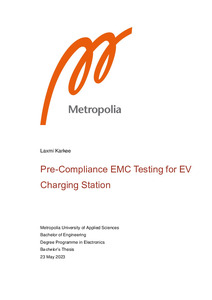Pre-Compliance EMC Testing for EV Charging Station
Karkee, Laxmi (2023)
Karkee, Laxmi
2023
All rights reserved. This publication is copyrighted. You may download, display and print it for Your own personal use. Commercial use is prohibited.
Julkaisun pysyvä osoite on
https://urn.fi/URN:NBN:fi:amk-2023060220762
https://urn.fi/URN:NBN:fi:amk-2023060220762
Tiivistelmä
The thesis project aimed to conduct pre-compliance electromagnetic compatibility (EMC) testing on prototype of the electric vehicle (EV) charging station as part of Big-Flash project in Metropolia University of Applied Sciences. The charging station was developed by Greenele Oy. It also involved study of suitable equipment available in Metropolia UAS to conduct required tests. Additionally, the process of debugging and flashing the Zephyr RTOS based software program to the board that controls the EV charger module was explored.
Fundamental pre-compliance EMC tests were conducted on the device following applicable SFS-EN IEC 61851-21-2:2021:en, general IEC, CISPR EMC standards to assess radiated and conducted emissions, electrostatic discharge (ESD) immunity, and EMC scan. Due to time constraints, the remaining general emission and immunity tests, such as electrical fast transient (EFT) and voltage surge, were not carried out, despite the availability of the required equipment on the premises. Though the test setup did not fully align with the standard requirements, it was still adequate for estimating emissions and immunity of the EV charging station during the initial stage of product development.
Compared to generic IEC and CISPR standards, radiated and conducted emissions of EUT were below the emission limit for class B device. During the ESD immunity test result, the EUT passed the test with ‘B’ performance criteria. EMC scan identified the areas of radiated PCB emissions near specific components on the PCB. It also detected minor emission issues related to soldering, indicating emission points near AC/DC power supply, voltage regulator and differential current sensor.
The results of pre-compliance EMC testing conformed to standard outlined in SFS-EN IEC 61851-21-2:2021:en standard for electric vehicle conductive charging system, including CISPR and IEC standards, suggesting EUT is compliant to EMC standards. The project facilitated identification and resolution of potential EMC issues of the EUT.
Fundamental pre-compliance EMC tests were conducted on the device following applicable SFS-EN IEC 61851-21-2:2021:en, general IEC, CISPR EMC standards to assess radiated and conducted emissions, electrostatic discharge (ESD) immunity, and EMC scan. Due to time constraints, the remaining general emission and immunity tests, such as electrical fast transient (EFT) and voltage surge, were not carried out, despite the availability of the required equipment on the premises. Though the test setup did not fully align with the standard requirements, it was still adequate for estimating emissions and immunity of the EV charging station during the initial stage of product development.
Compared to generic IEC and CISPR standards, radiated and conducted emissions of EUT were below the emission limit for class B device. During the ESD immunity test result, the EUT passed the test with ‘B’ performance criteria. EMC scan identified the areas of radiated PCB emissions near specific components on the PCB. It also detected minor emission issues related to soldering, indicating emission points near AC/DC power supply, voltage regulator and differential current sensor.
The results of pre-compliance EMC testing conformed to standard outlined in SFS-EN IEC 61851-21-2:2021:en standard for electric vehicle conductive charging system, including CISPR and IEC standards, suggesting EUT is compliant to EMC standards. The project facilitated identification and resolution of potential EMC issues of the EUT.
